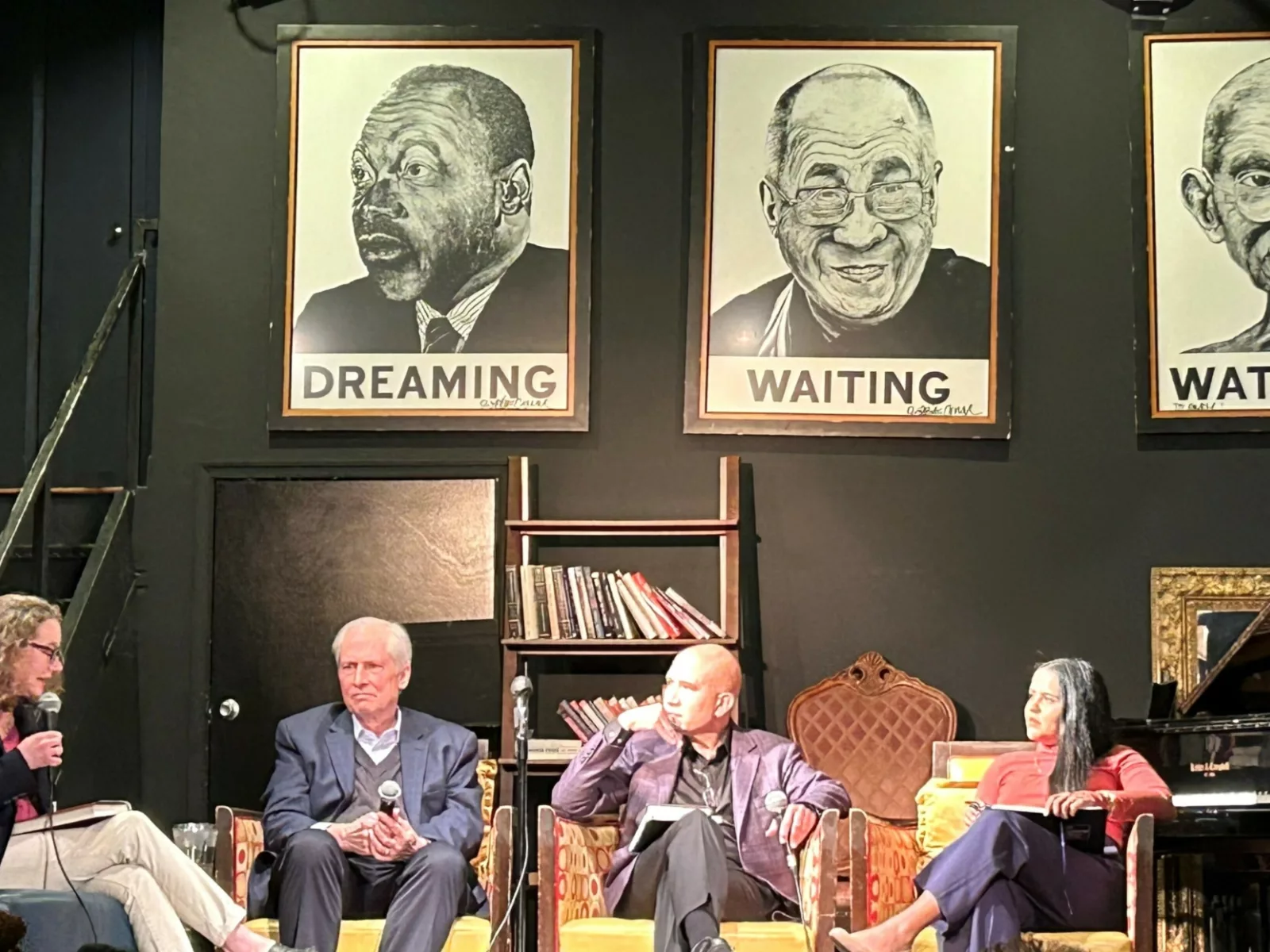After DeAnna Hoskins was released from prison in 1999, she applied for several jobs. Hoskins had worked doing data entry before her incarceration, and she was used to being hired on the spot. But after serving her sentence, the interviews played out much differently.
Often, she would get a preliminary offer. Then, the employer would conduct a background check and rescind the offer. At one potential job at a bank, Hoskins had gone as far as negotiating her salary when the manager told her she couldn’t hire her because of the results of the background check. Hoskins asked for the bank’s policy on hiring people with a criminal history but was told that one did not exist.

“I found out that this was this internal rule that we are not going to hire people who have criminal backgrounds,” said Hoskins, who is now the president and CEO of JustLeadershipUSA.
Since that experience, Hoskins has heard similar stories of people with a criminal history having trouble finding employment, including from her son, who she said was turned down for jobs at Home Depot and McDonald’s because of his conviction.
A first-of-a-kind study by the RAND Corporation released today reaffirms those experiences. The study, Barred from Employment, found that more than half of unemployed men in their 30s have a criminal history. An estimated 64% of unemployed men have been arrested and approximately 46% of unemployed men have been convicted of a crime by age 35. Black men are 33% more likely to be arrested than white men, further compounding systemic challenges limiting their employment opportunities. By age 35, roughly half of Black men have been arrested, one in three have been convicted of a crime, and one in four have been incarcerated.
“The numbers are validating what we’ve been screaming about,” Hoskins said. “It has been an issue, and it’s mostly impacting more black males than anything.”
roughly half of Black men have been arrested, 1 in 3 have been convicted of a crime, and 1 in 4 have been incarcerated.
Employers struggling with millions of job vacancies, in part because of the pandemic, may find these findings to be deeply revealing. While other research has focused on documenting unemployment among those who have been incarcerated, the RAND study is the first to gather data in the opposite direction, estimating the incidence of criminal histories among men in the United States who are unemployed.
“Most government programs focus on providing unemployed people with new skills in order to get them into the workforce,” said Shawn Bushway, senior policy researcher at RAND. “But if you only focus on skills development, you are missing a big part of the problem. The unemployment system almost never looks at the role that criminal history plays in keeping people out of the workforce.”
Barriers to Reentry
To conduct the study, RAND researchers used data from roughly 4,600 men who participated in the National Longitudinal Survey of Youth, 1997. The federal study collects data, including job information and criminal justice system involvement, on people born between 1980 and 1984, surveying them regularly since 2011. Arnold Ventures commissioned the study as part of its work on reintegration, which it launched during the pandemic. The work is focused in large part on removing or limiting barriers people face when seeking employment after involvement in the criminal legal system.
“At Arnold Ventures, we believe that a criminal record should not be a life sentence to poverty. This study demonstrates that addressing the harms of a criminal record is not just a criminal justice issue, but also is crucial for an equitable economic recovery,” said Carson Whitelemons, criminal justice manager at Arnold Ventures, who witnessed her father struggle to find a job after he returned home from prison.
RELATED: The Upside of Hiring People with Convictions
People with a criminal history have long faced challenges in the job market. A complex web of local, state, and federal statutes and regulations bar people with criminal records from accessing certain opportunities. While these consequences can affect everything from housing to public benefit eligibility, no area is more impacted than the ability to find and retain meaningful employment: Thousands of state and federal laws directly limit the ability of employers to hire or retain workers with certain convictions; restrict impacted people’s access to occupational licenses needed to work in certain fields; and restrict access to business licenses needed to pursue self-employment.
In recognition of this problem, a growing number of states are now taking action to restore opportunities to people with past criminal convictions. A new report from the Collateral Consequences Resource Center (CCRC) published this month found that in 2021, 17 states have passed 26 new laws aimed at reducing these legal barriers to employment for people with criminal records.
We believe that a criminal record should not be a life sentence to poverty.Carson Whitelemons criminal justice manager at Arnold Ventures, who witnessed her father struggle to find a job after he returned home from prison
State and federal law is just one area of concern. Even when people with records are not explicitly legally excluded from accessing certain jobs, employers may screen them out due to in-house policies that prevent them from hiring people with records. And though there have been efforts in some states to prohibit employers from asking about criminal history during the application process or to motivate them to be more thoughtful when considering an application from an impacted person, they are still largely permitted to adhere to their own internal policies when deciding whether to follow through on their offer.
Adding to the problem, cheap and accessible software makes it easy for companies to perform mass background checks, providing records to employers with little to no context on how those records should be understood or how little relevance they may have to the type of person a job candidate actually is. This practice can be devastating to justice-involved individuals’ job prospects. One study found that people convicted of a crime received less than half of callbacks than people who did not have a conviction, despite being just as qualified.
Disparities in Earnings
For people who do secure a job, earnings disparities by race are glaring, and are exacerbated by criminal legal system involvement. RAND researchers found that Black men who have never been arrested make 39.4% less than white men who have never been arrested —or $22,000 less.
Among people who have been arrested, Black men make an average of 36.5% less than white men. And for people who’ve been incarcerated, black men make an average of 50.5% less than white men. In other words, criminal legal system involvement is worsening underlying economic disparities that themselves are the product of myriad historic, systemic realities and discriminatory policies.
The study also adds further evidence of the correlation between legal system involvement and educational attainment or opportunities. Among unemployed people, the study finds that half of Black men with an arrest history are either GED holders or dropped out of high school, compared to 24% of those with no arrest record. That figure — the rate of unemployed people with GEDs or who left high school — is 41% for white men and 47% for Hispanic men.
The Link Between Economics, Criminalization
This adds another layer of challenge that people with records must confront: A dearth of well-paying jobs that do not require college degrees makes it difficult for people with criminal records to be successful in the job market.
In addition, people who are formerly incarcerated are often deprived of programming that provides them with marketable job skills during their time in prison. Bushway explained that economics and criminalization are inextricably linked. As millions of manufacturing jobs left urban areas in the 1980s, there was at the same time a substantial increase in incarceration in the United States.
“So what you have left, and this differentially affected African-American men, was a situation where there were very few jobs,” he said. When they were released, Bushway said, “Criminal history records actually, legally prevent them from working in many of the jobs for which they began training.”
Hoskins shares this concern for the role that records might play in people’s seeking and keeping employment. She favors fair chance hiring practices that involve alerting people in the recruitment process who are not eligible for the job, preventing them from wasting further time, resources, or frustration on a process that will be fruitless due to employer policies or local laws. For example, people with certain convictions may be told they can not apply for jobs with children before they apply.
“If you’re transparent and upfront, it actually reduces the stress of people with criminal backgrounds looking for a job,” she said. Most of all, though, she said it’s essential that companies change their cultures to ones of diversity and inclusion. And as Whitelemons points out, those changes must be matched or exceeded by legislative reforms that mitigate barriers to employment.
“We’re sending people to prison to be accountable for the mistakes that they made, and then you’re releasing them with the expectation you will not commit a crime or you will become a productive member of society,” Hoskins said. “But the basic human needs, like employment, are denied to the individuals most susceptible to criminal behavior.”
Reintegration
A criminal record should not result in a life sentence to poverty or the inability of a person to care for themself and their family, and move forward.
Learn More




















